#toxic taylor swift
Explore tagged Tumblr posts
Text
Taylor Swift is a Female Rage icon? Get a Grip.
I’ve just received word that Taylor Swift is calling her show “Female Rage: The Musical.” Here is my very much pissed off response to that nonsense:
The phrase, Female Rage has an intimately rich history:
Some of the first accounts of female rage dates to the Italian renaissance. To be clear, women in those days were not allowed to become painters- the arts were seen as the domain of men. They did not believe that women have rich inner lives capable of delivering the type of artistic innovation with which renaissance men were obsessed.
However, rebels abounded, through the might of their fucking rage. Several women created some of the most compellingly emotional paintings I’ve ever fucking seen. They did it without permission, without financial support, and often under the threat of punishment. They did it as a protest. In paintings like “Timoclea Killing Her Rapist” by Elisabetta Sirani (1659), and another by Artemisia Gentileschi “Slaying of Holofernes” (1612) as it depicts the bravery of Judith as she slayed a traveling warlord out to rape Judith and enslave her city. The painting often is referred to as a way Artemisia was envisioning herself as slaying her rapist. These paintings were used against these women as proof that they were unfeminine- and far too angry. Both these women suffered immensely for their audacity to call attention to the violation men perpetrated on them. Female Rage bleeds off these paintings- bleeds right through to the bone-deep acknowledgement of the injustice women faced being barred from the arts and having their humanity violated in such a sick way. Both women were hated- and considered far too angry.
In philosophy, also as early as the 15th century, an example of female rage is a philosophical text, often hailed as one of the first feminists works in the western world, written by Christine de Pizan titled The City of Ladies (1405). She wrote in protest on the state of women- writing that “men who have slandered the opposite sex out of envy have usually know women who were cleverer and more virtuous than they are” (“The City of Ladies”). People mocked her all her life- but she stood fast to her convictions. She was widowed at a young age with children to feed and the men wouldn’t let women have jobs! She wrote this book and sold it so that she could feed her family- and to protest the treatment of women as lesser than men. Her work was called aggressive and unkempt- they said she was far too angry.
In the 18th century, a young Mary Wollstonecraft wrote, A Vindication of the Right of Women ( 1792) upon learning that the civil rights won in the French Revolution did not extend to women! She wrote in protest of the unjust ways other philosophers (like Rousseau) spoke about the state of women- as if they were lesser. She wrote to advocate for women’s right to education, which they did not yet have the right to! She wrote to advocate for the advancement of women’s ability to have their own property and their own lives! The reception of this text, by the general public, lead to a campaign against Wollstonecraft- calling her “aggressive” and far too angry.
Moving into modernity, the 1960’s, and into literary examples, Maya Angelou publishes I know why the caged Bird Sings (1969) in which she discusses the fraught youth of a girl unprotected in the world. It beautifully, and heart-wrenchingly, described growing up in the American South during the 1930’s as it subjected her to the intersection of racism and sexism. The story is an autobiographical account of her own childhood, which explains how patriarchal social standards nearly destroyed her life. Upon the reception of her book, men mostly called it “overly emotional” and far too angry. Maya Angelou persisted. She did not back down from the honesty with which she shared her life- the raw, painful truth. With Literature, she regained a voice in the world.
Interwoven into each of the examples I have pulled out here, is the underlying rage of women who want to be seen as human beings, with souls, dreams and hopes, yet are not seen as full members of society at the behest of men. They take all that rage, building up in their souls, and shift it to create something beautiful: positive change. Each of these cases, I have outlined above, made remarkable strides for the women as a whole- we still feel the impact of their work today. They were so god-damn passionate, so full of righteous anger, it burst out into heart-stopping, culture-shifting art. Feminine rage is therefore grounded in experiences of injustice and abuse- yet marked too by its ability to advocate for women's rights. It cannot be historically transmogrified away from these issues- though Taylor Swift is doing her best to assert female rage as pitifully dull, full of self-deprecation, and sadness over simply being single or losing money. She trivializes the seriousness with which women have pled their cases of real, painful injustice and suffering to the masses time and time again. The examples above deal with subjects of rape, governmental tyranny, and issues of patriarchally inspired social conditioning to accept women as less human than men. It is a deadly serious topic, one in which women have raised their goddamn voices for centuries to decry- and say instead, “I am human, I matter, and men have no right to violate my mind, body, or soul.”
The depictions of female rage over the last few centuries, crossing through many cultures, is an array of outright anger, fearsome rage, and into utter despair. The one unyielding, solid underpinning, however, is that the texts are depicting the complete agency of the women in question. The one uniting aspect of female rage is that it must be a reaction to injustice; instead of how male depictions of female rage function, (think Ophelia), the women are the agents of their art with female made- female rage. They push forth the meaning through their own will- not as subjects of male desires or abuses, but as their own selves. That is what makes the phrase so empowering. They are showing their souls as a form of protest to the men who treat women like we have no soul to speak of.
Taylor Swift’s so-called female rage is a farce in comparison. Let’s look at an example: “Mad Woman” (2020). I pull this example, and not something from her TTPD set, because this is one of the earliest examples of her using the phrase female rage to describe her dumb music. (Taylor Swift talking about "mad woman" | folklore : the long pond studio sessions (youtube.com)
The lyrics from “Mad Woman” read “Every time you call me crazy, I get more crazy/... And when you say I seem angry, I get more angry”
How exactly is agreeing with someone that you are “crazy” a type of female rage in which she’s protesting the patriarchy. The patriarchy has a long history of calling women “insane” if they do not behave according to the will of men. So, how is her agreeing with the people calling her crazy- at all subversive in the way that artworks, typically associated with concept of female rage, are subversive. What is she protesting? NOTHING.
Then later, she agrees, again, that she's “angry.” The issue I draw here is that she’s not actually explicating anything within the music itself that she’s angry about- she just keeps saying she's angry over and over, thus the line falls flat. The only thing this anger connects to is the idea of someone calling her angry- which then makes her agree that she is... angry. So, despite it being convoluted, it’s also just not actually making any kind of identifiable point about society or the patriarchy- so again, I beg, what on Earth makes this count as Female Rage?
In essence, she is doing the opposite of what the examples above showcase. In letting an outside, presumably male, figure tell Taylor Swift what she is feeling, and her explicit acceptance of feeling “crazy” and “angry,” she is ultimately corroborating the patriarchy not protesting it. Her center of agency comes from assignment of feelings outside of herself and her intrinsic agreement with that assignment; whereas female rage is truly contingent on the internal state, required as within our own selves, of female agency. As I stated above, the women making female rage art must have an explicit agency throughout the work. Taylor Swift’s song simply does not measure up to this standard.
Her finishing remarks corroborates the fact that she's agreeing with this patriarchal standard of a "mad" or crazy woman:
"No one likes a mad woman/ You made her like that"
Again, this line outsources agency through saying "you made her like that" thus removing any possibility of this song being legitimate female rage. There is simply no agency assigned to the woman in the song- nor does the song ever explicitly comment on a social issue or protestation of some grievous injury to women's personhood.
She honestly not even being clever- she's just rhyming the word “crazy” with “crazy.” Then later rhyming “angry” with “angry.” Groundbreaking stuff here.
Perhaps Taylor Swift is angry, in “Mad Woman,” but it is not the same type of rage established in the philosophical concept of female rage of which art historians, philosophers, and literary critics speak. Instead, it is the rage of a businesswoman that got a bad deal- but it is not Female Rage as scholars would identify it. In “Mad Woman” I fear her anger is shallow, and only centered on material loss- through damaging business deals or bad business partners. She is not, however, discussing what someone like Christine de Pizan was discussing by making a case for the concept that woman also have souls like men do. In her book, she had to argue that women have souls, because men were unconvinced of that. Do you see the difference? I am saying that Swift’s concerns are purely monetary and material, whereas true examples of female rage center on injustice done against their personhood- as affront to human rights. Clearly, both things can make someone mad- but I’d argue the violation of human rights is more serious- thus more deserving of the title “Female Rage.”
Simply put, Taylor Swift is not talking about anything serious, or specific, enough to launch her into the halls of fame for "Female Rage" art. She's mad, sure, but she's mad the way a CEO gets mad about losing a million dollars. She's not mad about women's position in society- or even just in the music industry.
She does this a lot. The album of “Reputation” was described as female rage. Songs in “Folklore” were described as female rage. Now, she’s using the term to describe TTPD, which is the most self-centered, ego-driven music I’ve heard in a long time.
Comparing the injustice, and complete subjugation, of women’s lives- to being dumped by a man or getting a bad deal- wherein she is still one of the most powerful women of the planet- is not only laughable, but offensive.
#anti taylor swift#taylor swift critical#ex swiftie#mad woman#folklore#maya angelou#christine de pizan#artemisia gentileschi#mary wollstonecraft#Elisabetta Sirani#art history#books and literature#feminist#feminism#female rage#taylor swift#activism#toxic swifties#toxic taylor swift#philosophy#fuck Rousseau#I'm a professional Taylor Swift Critic
674 notes
·
View notes
Text
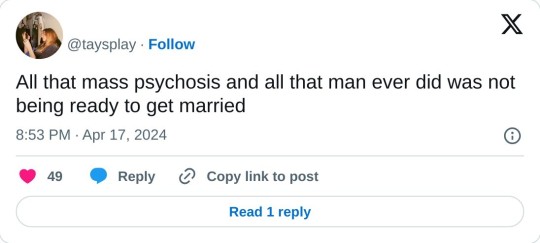
🙄🙄🙄🙄🙄
#free joe alwyn#jalwyn#joe alwyn#anti taylor swift#joealwyn#toxic swifties#shit swifties say#toxic taylor swift#free joe alwyn from psycho swifties
508 notes
·
View notes
Text
Her empathy:
Watched me daily disappearing For just one glimpse of his smile
I stopped trying to make him laugh, stopped trying to drill the safe
Another summer, taking cover, rolling thunder. He don't understand me Splintered back in winter, silent dinners
Grey and blue and fights and tunnels, Handcuffed to the spell I was under
For just one hour of sunshine Years of labor, locks and ceilings In the shade of how he was feeling
The more I look at the lyrics and how she talks about him, the more I despise her.
did you guys notice that the main theme she put about her relationship with joe in this album was that it felt like a cage to her because he was depressed. the song, so long london makes me feel so sorry for joe because she is resenting him for having his blue days and not snapping out of his depression faster so that she can have a perfect wedding. it's so insensitive given how joe was there for her during her darkest days and pulled her out of it, deleted her social media apps so she wouldn’t see the mean things people say about her etc etc. he was there for her when nobody else was. but she couldn’t be there for him when it was his time. she got bored and started rekindling her fling with matty when joe was dealing with his issues on his own. and she wonders why he wouldn’t marry her?
the worst thing happened after the breakup. she knows that joe deals with depression and yet she sent her fans after him to harass him on a daily basis for a whole year! she used the cheating rumours as a marketing scheme to release an album about matty. she let her fans harass any woman that worked with joe. how can a person be so vile?
#joe alwyn#anti taylor swift#fr#free joe alwyn from psycho swifties#free joe alwyn#toxic taylor swift#to#toxic swifties#taylor swift needs to grow up
2K notes
·
View notes
Text



they just got to have a sleepover and nothing bad ever happened at all
#dndads#dungeons and daddies#dndads taylor swift#lincoln li wilson#normal oak#scary marlowe#hermie the unworthy#oakworthy#dndads spoilers#idk how they did it but they nailed the extremely codependent maybe a little toxic sort-of-polycule queer friend group dynamic#i am deeply unwell is it obvious#i just think hermie and norm would've fixed eachother. nvm that everyone's worst relationship ever happens around that age it's fine#also they said fuck that one 7 eleven in particular#they had to pick CAH because monopoly or uno would've ended with someone dying#thank you to the dndads discord for motivating me to finish the first one. it was bad#tell me why scary without all her makeup is making me emotional
3K notes
·
View notes
Text
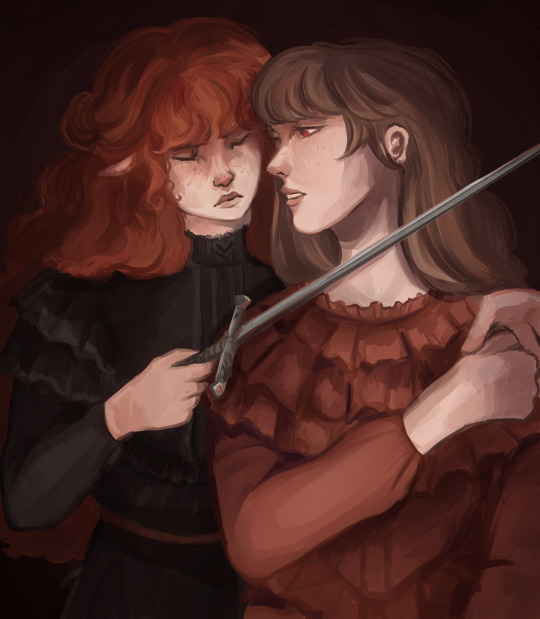
nobody wins, if I kill you / would I have to forgive you still?
casting gempearl on your dash everyone look out
#they make me FERAL#straight up CRAZY#ask me about it cause the LORE#the FIGHTING#the TOXIC YURI#hermitcraft#life series#secret life#slsmp#trafficblr#gempearl#pearlgem#can never remember which one it is#shiny duo#spark draws#also pearl looks like taylor swift here and that was so unintentional i tried so hard to fix it and just couldn't I'm so sorry
1K notes
·
View notes
Text
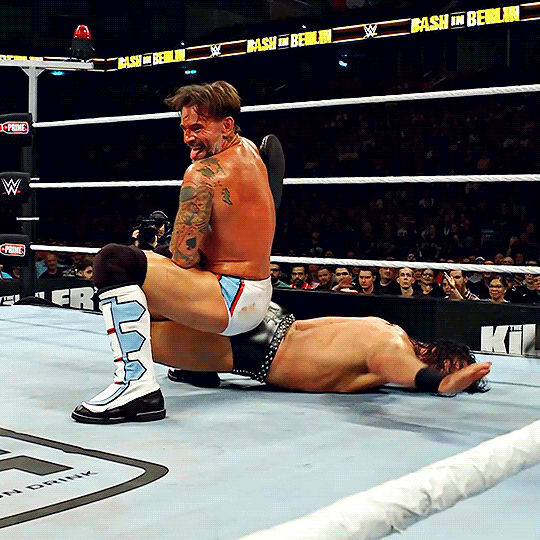

#this is what netflix is paying 5 billion dollars for
#wwe#wweedit#cm punk#raw#drew mcintyre#wwe raw#punkintyre#monday night raw#wwe gifs#wrestlingedit#bash in berlin#stuff i made#a w for toxic yaoi#k i can make ONE punkintyre post#as a treat#when he says hes taylor swift for men he means it#middle aged men all over the globe want this dude carnally idk what it is but its real 1 bill phil more like [redacted]
582 notes
·
View notes
Text
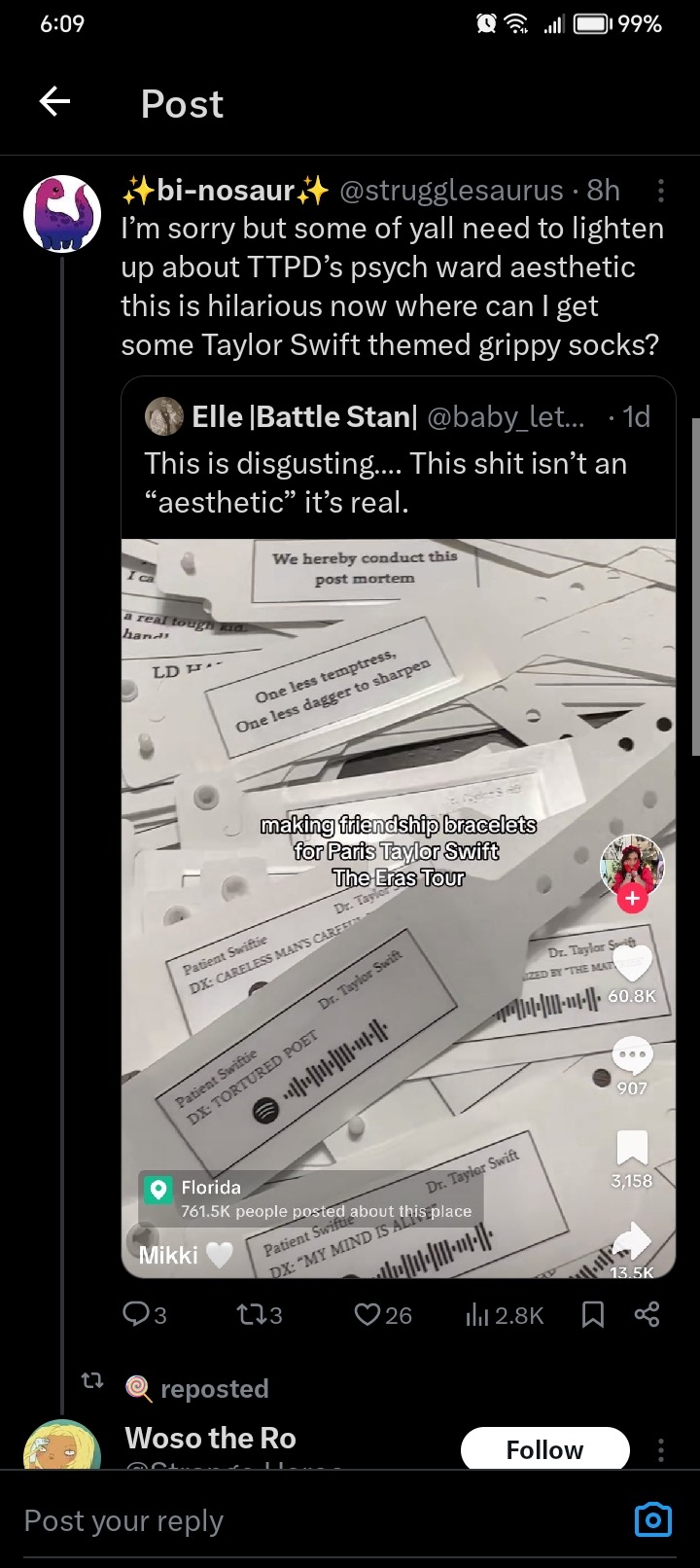
Imagine thinking psych wards are fun and hilarious. I've seen swifties wanting to wear psych ward dresses etc to eras
So sick and tired of their shit. This is not some aesthetic
607 notes
·
View notes
Text
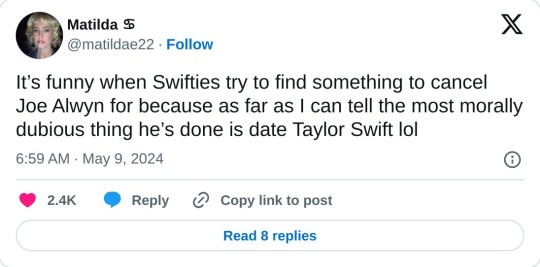
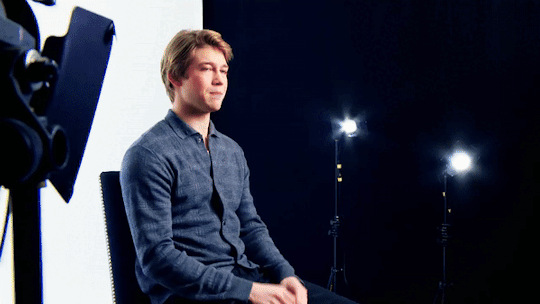
#free joe alwyn#jalwyn#joe alwyn#anti taylor swift#joealwyn#toxic swifties#shit swifties say#toxic taylor swift#free joe alwyn from snakes#free joe alwyn from psycho swifties
218 notes
·
View notes
Text
So, before the American Civil War..... Ok... I don't wanna think about this...

i’m dead 💀💀💀💀💀
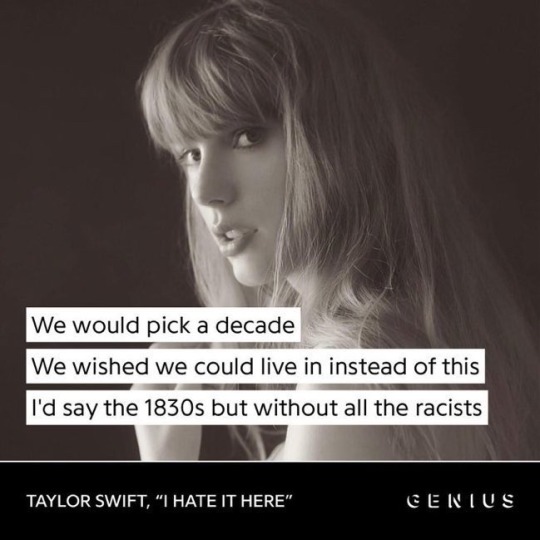
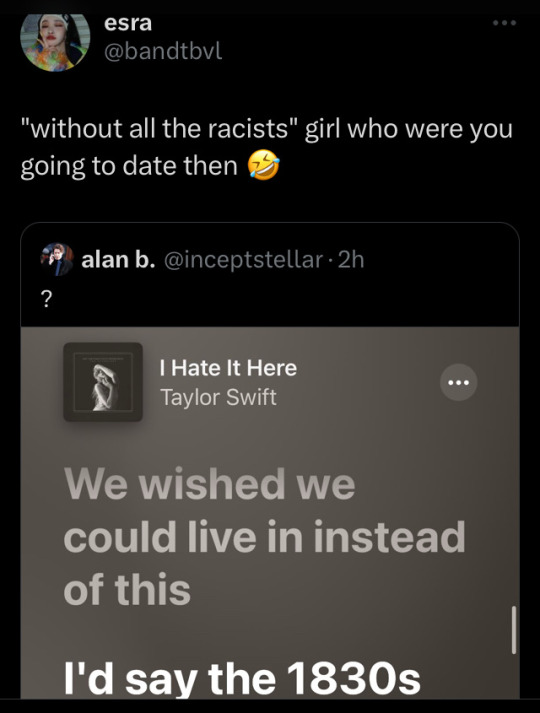
#anti taylor swift#free joe alwyn from psycho swifties#free joe alwyn#toxic taylor swift#toxic swifties#shit swifties say
2K notes
·
View notes
Text
"Checkmate. And now you're mine."
#squid game#squid game 2#ship#otp#ship edit#seong gi hun#hwang in ho#inho x gihun#gihun x inho#gihun x frontman#kdrama#taylor swift#mastermind#toxic yaoi#old man yaoi
170 notes
·
View notes
Text
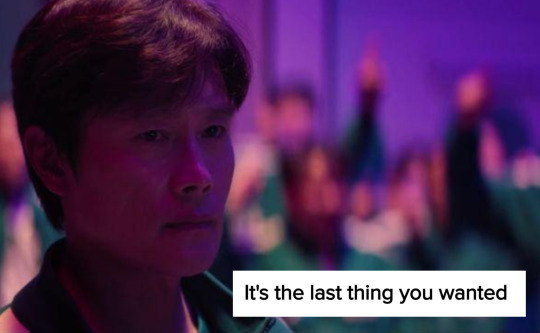
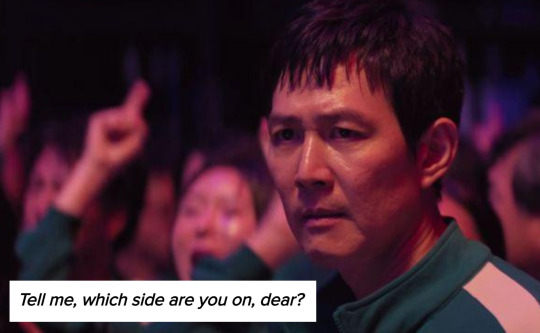
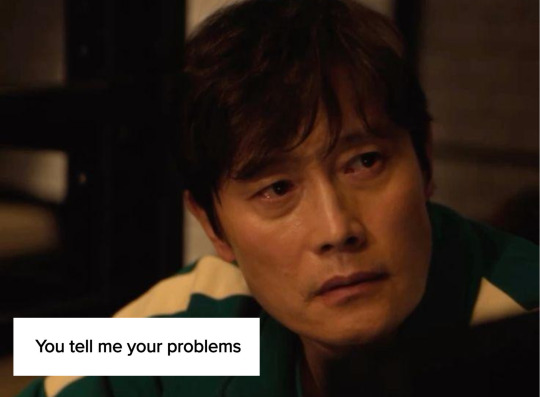
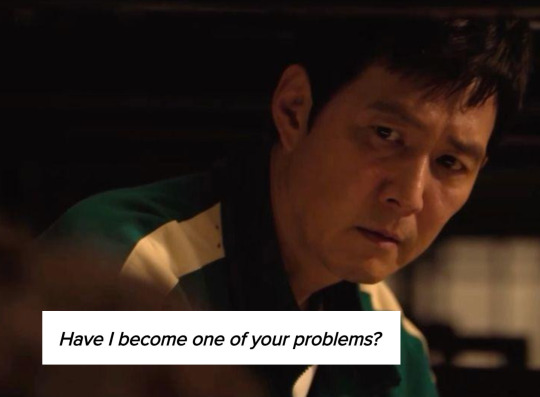
the alcott, the national ft. taylor swift // inho & gihun, squid game
#457#inhun#squid game#gihun x inho#ginho#hwang in ho#seong gi hun#front man#old man yaoi#toxic yaoi#doomed yaoi#inho#gihun#gihun x frontman#squid game spoilers#squid game 2 spoilers#squid game 2#squid game s2#squid game 3#squid game s3#squid game season 3#squid game season 2#web weaving#webweaving#taylor swift
68 notes
·
View notes
Text
FFS! Free Joe Alwyn!
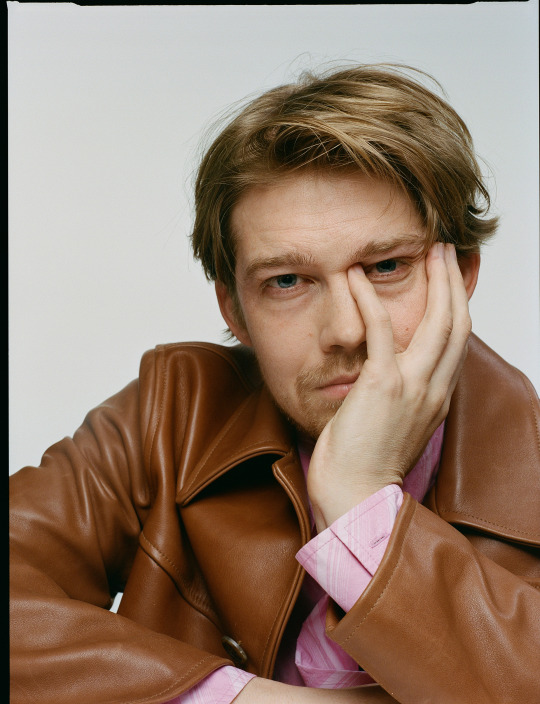
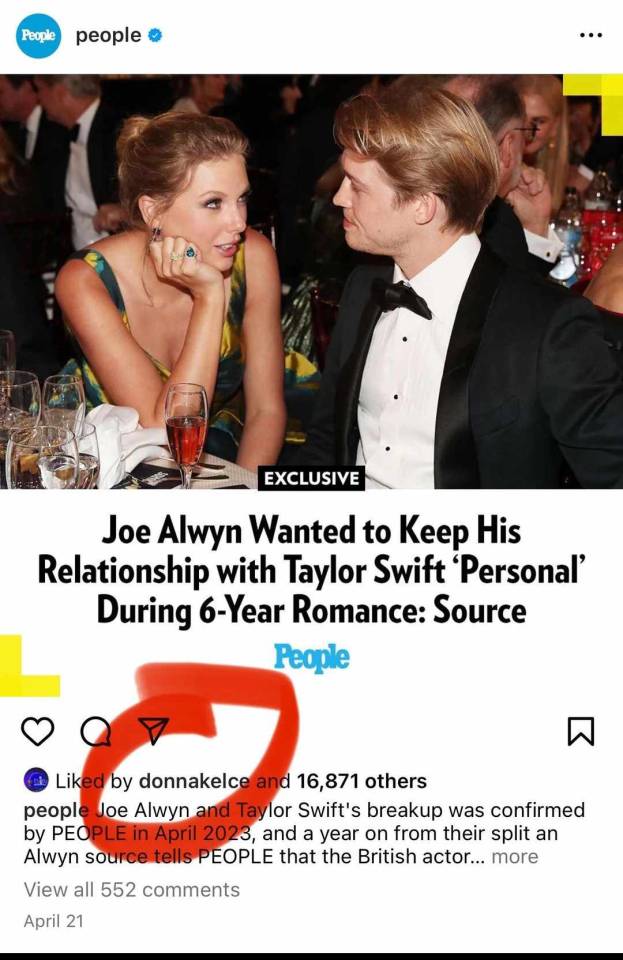
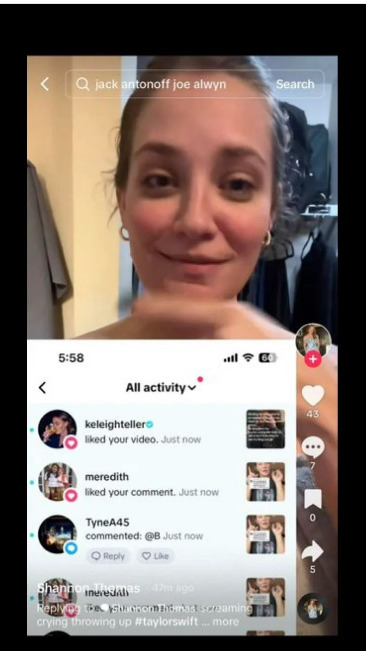

creepy
FREE Joe Alwyn
#anti taylor swift#free joe alwyn from psycho swifties#free joe alwyn from snakes#free joe alwyn#shit swifties do#toxic taylor swift#toxic swifties
32 notes
·
View notes
Text












Taylor Dearden as Ophelia Mayer in
SWEET/VICIOUS (2016-2017)
#i was gagged when i discovered joseph kahn of britney spears toxic and taylor swift blank space mv fame directed the first two eps of this#taylor dearden#ophelia mayer#sweet/vicious#sweet vicious#the pitt cast#*my gifs*
71 notes
·
View notes
Text

The media finally calling out taygreedy was not on my bingo card.
And good for them. Clancy is an AMAZING album
297 notes
·
View notes
Text
Taylor Swift Can't Write- She is not a serious or important writer. She is blatantly normalizing cheating in her music.
Let’s talk about Taylor Swift’s honest attempt at coherent narrative -
Just to be clear, the songs in question: Betty (2020), August (2020), and Cardigan (2020).
In these songs, Swift, of her own insistence, makes a clear attempt at drafting together a coherent storyline. I, however, found her work lacking while considering it against the many thousands of other short stories I have read. It lacks any sincerity in giving the moment in which the characters experience self-reflection, or "Epiphany" moment, and growth.
An Epiphany is defined as a sudden spiritual manifestation- and it is this I would posit as something that Swift clearly lacks in her writing. She lacks the spiritual, or emotional, depth to accurately tell a so-called "coming-of-age" type story in which the main requirement is that the character has an "Epiphany" about the nature of life to signify them growing up.
I will explain:
A short story- which I am analogizing to the multi-song arch from Swift- is typically meant to have an epiphany moment in which the main character finally calcifies the main point or the moral of the story. Without the impact of this moment within a short narrative- there is no arc, no moral, and therefore no real story.
Afterall, what is a story, but a coherent subsistence of writing aimed at identifying some universality of human existence (eg.) a moral, a point, or the main message? If I want to get philosophical about it (and I always do), narrative is the act of creation through which the particulars become implicit to a universal experience. Thus, it is a necessity of storytelling- to include the thematic message- or moral backbone of the work.
Swift’s three song arc is intrinsically incoherent, so it becomes difficult to pinpoint exactly what each character is thinking or feeling. I would, however, suggest that through lines like “slept next to her, but / I dreamt of you all summer long” (“Betty” 2020), and lines like “I never needed anything more/ whispers of ‘Are you sure?’ / ‘Never have I ever before’” (“August” 2020). Therein builds an internal tension between the three characters, James seems to be lamenting his choices to sleep with August and ditch Betty for the summer; whereas August is honestly expressing the fact that this is her first time, so it becomes obvious this means a lot to her. First, we see James's apologizing to Betty saying that the other girl, essentially means nothing by saying he was dreaming of Betty all summer even while with August. We also get the other perspective of the other girl losing her virginity to James during the same summer in which he is thinking about Betty every night.
Already, all the characters are set up to be dislikable- which is not always to the detriment of storytelling. However, it is to the detriment of her storytelling that at no point Swift makes use of external POV, or internal POV, to show any form of personal growth or condemnation of the intuitively morally corrupt actions of James here. Thus, there is no real story- according to the theory of “short-story” telling I laid out above.
It is her lack of condemnation towards cheating- and the immature irreverence James treats August with- that solidifies this arc as being a rather poor attempt at coherent narrative. Simply, Swift is either an inept storyteller- or she is blatantly normalizing cheating while also treating “the other woman” like a placeholder. (Clearly, Anti-Feminist rhetoric, btw). It’s especially bad that this storyline reaches no “moral of the story” since it is so obviously August’s first time.
The closest we get to any kind of meta-narrative commentary on thematic point, from Swift as the external 3rd person POV, is with this line “A friend to all is a friend to none/ Chase two girls, lose the one/ When you are young, they assume you know nothing” (“Cardigan” 2020). Again, her use of POV is rather amateurish- because she returns to internal 1st person POV with use of the word “you” in the latter half of the line- which leads me to believe she really doesn’t know how to inculcate the different POV’s into her writing. She’s an amateur- and there's is nothing inherently wrong with that, however, if we could all stop lauding her as literary genius when she is so clearly not that would be “awesome.” Thanks.
She continues the rest of the song back into Betty’s 1st person POV. The poignant nature of this line about "losing one girl" doesn’t land because the rest of the song is about how James is returning to Betty. Swift writes, “I knew you’d miss me once the thrill expired/ and you’d be standing in my front porch light/ And I knew you’d come back to me” (“Cardigan” 2020). Beside the fact that this line is internally incoherent held up against the setting of “Betty” which is broad daylight, so James would not actually be in the porch light if the sunlight suffices, it is also quite obviously the culmination in which Betty is taking James's back. If there is any thematic message here- and I can only loosely believe this is an actual message here- Swift is saying that cheating is Okay as long as the girl, you actually respect and want, is willing to forgive you.
And I’m supposed to enjoy this arc? People are supposed to be impressed with Swift because she came up with this garbage?
She clearly has no grasp on Narrative coherence, no grasp of utilizing POV switching to make narrative more emotionally impactful, and no grasp on how to embed a good moral of the story into her work. So, she has none of the markings of actual great writer.
The effect of all this is a subterfuge of lackluster emotional appeals- and a toxic love triangle that never resolves into personal self-reflection or growth. The story devolves into blameless banality with no personality or literary value whatsoever- just a reiteration of self-centered egoism that enables James to act without thought to the feelings of others. This is what Swift propagates as good storytelling? Is this morally sound story telling?
Let me further drive my point home by dichotomizing this pitiful attempt at narrative coherence with the work of a literary genius, James Joyce.
Has anyone here ever read “Araby” (1914) by James Joyce? (Sidenote: If you love when Hozier talks about issues of British colonialism in Ireland- you will most likely enjoy James Joyce as well- if you love critique of both organize religion and its sociohistorical ties to colonialism- you'll love Joyce).
My critique too- ties into Joyce, where he showcases the blissful ignorance, or naivety, of youth in pursuit of love, Swift showcases no such thing. She is often praised for her juvenile writing schema- yet in her most overt attempt at writing a youthful romance she fails to interject the most important aspect of youth- Naivety versus painful realizations. In adulthood, when we all reprise the past, and trace back into our memories, we often speak fondly of the naivety of youth- with a little knowing twinkle in our eyes as young people around us make the same mistakes we did. It’s so beautifully human to reflect like this- and Swift manages to add nothing of this universal human experience into her work, even though it is often said that her only saving grace is the ability to capture “teenage petulance” and the proclivities of youth. In other words, I’m saying she’s not even doing the thing she’s known for well enough. She writes this love story like they’re all a bunch of bitter adults, not kids stepping into thoughts of love for the first time. There’s no simple wonder at love- instead, she writes about cheating and feeling jaded. Ditching people for the summer only to come back to the first girl with an "I'm sorry" and "she meant nothing." Where is the personal growth in a story like that? In which James gets away with saying "she meant nothing," and August is not shown having any agency or reclamation of self after James essentially uses her. Then, to top it all off, Betty most likely gets back together with James. There is no growth to speak of in any of this- it does not qualify as a "coming of age" story- nor does it particularly qualify as a story at all.
This is like English Creative Writing 101 class- btw. It's strange that Swift does not grasp concepts I've taught to college freshmen before. If the freshmen can handle learning it- surely Swift could also be able to learn and improve the thing she does as a job? Right? No?
“Araby” is a story of a similar predicate to Swift attempt at narrative. So, I thought it most apt to include here as an example which also employs use of Epiphany in short story telling.
In quick summation, “Araby” is the story of a young boy who has a rather intense crush on a neighbor girl. He promises this girl that he will go buy her something at the market, and in doing so sets off a sequence of events which leads to his ultimate disillusionment with the ideals of youth and love.
Early on in his character development, we see a boy who has an overly romantic view on life, with lines like “All my senses seemed to desire to veil themselves and, feeling that I was about to slip from them, I pressed the palms of my hands together until they trembled, murmuring: ‘O love! O love!’ many times” (“Araby” Joyce). He is so clearly caught up in the longing for this girl- that he truly forgets reality for a moment. His senses slip from him, and he is fully immersed into the lost revery of his little crush on the neighbor girl. Then, like magic, she speaks to him for the first time the next day. She asks him if he will go to the market, and he responds eagerly- Yes. He promises to buy her something.
The conflict of the story happens at this point- the young boy meets every obstacle in life preventing him from getting to the market on time. He struggles to find money and then he struggles to find the time in the midst of his other obligations to his family. Joyce is clearly showcasing how our romantic visions of life, of everything going perfectly and romance being easy, can so easily be disrupted by the realities of poverty and the responsibility we all bear for family or others.
The end of the short story outlines the “moral of the story” in which the young man, now nearly too late for the market and without enough money to actually buy anything, with the last refrain that “Gazing up into the darkness I saw myself as a creature driven and derided by vanity; and my eyes burned with anguish and anger” (“Araby” Joyce). Thus, Joyce drives home the "epiphany" moment, or the self-reflective moment of character growth, as it pertains to the fruitless endeavors of youthful vanity in romance. Stating, essentially, that people only dream of overly romantic scenes to bolster their own perception of reality as something that should go perfect for them. Life is not perfect, nor is it ever fair, and nothing happens as fantasy suggests it should- this is the hardest, and often the first, life lesson young people ever face. Anguish and Anger. What a beautiful phrase to remark upon- as this poor young man realizes life is comprised mostly of being “a day late and a buck short.”
This intensity- this moral backbone is what brings the story to life. The way this story enumerates the youthful hope- to the burgeoning adult reality- as something full of anguish -allows readers to bridge empathy towards others as WE all grow up in a difficult world. This is the "Epiphany." This appeal universal human experience, through particular circumstances like that of a young man in early 1900’s Dublin, is what is missing in Swift’s work. She gives us nothing but her own selfish refraction of immoral behavior without any appeal to greater human impulse or discovery. Her work rings hollow in the face of actually talented writers like Joyce. She lacks the same depth, sophistication, and ability to actually make the story into a narrative arc.
She claims to write about teenage, coming of age-esque, discovery yet lacks any ability to actually showcase, with empathy, the ways in which anguish at their own naïveté presupposes teenage petulance.
She writes out the most shallow- surface level depiction of some b-plot from a bad fanfiction and wants to pretend that she is a literary genius. Yawn.
Addendum- I am aware that “Araby” is also a story predicated on ideas of Freedom vs Colonialism. To those of you who know the story well, I hope you don’t mind I choose to focus in on the “coming-of-age" part of the story in order to more clearly connect it to Swift’s work. I am not, however, ignoring the real sociohistorical implications of poverty, colonialist attitudes, and human rights thematic points in the story. I know.
“Araby” by James Joyce is free at The Project Gutenberg eBook of Dubliners, by James Joyce
#anti taylor swift#fuck taylor swift#taylor swift critical#toxic taylor swift#toxic swifties#ex swiftie#anti swifties#james joyce#Araby#literary criticism#taylor swift criticism#folklore#betty#cardigan#august#literary theory#literary analysis#if you love#hozier#you will also love James Joyce
98 notes
·
View notes
Text
And it hits me, I just don’t understand
How you don’t miss me
Six weeks of breathing clean air, I still miss the smoke
It's 6 week AFTER they broke up.
Are all swifties illiterate? 🙄🙄🙄
Oh he cheated
#joe alwyn#anti taylor swift#anti swifties#toxic taylor swift#toxic swifties#shit swifties do#shit swifties say#free joe alwyn from psycho swifties#free joe alwyn
22 notes
·
View notes